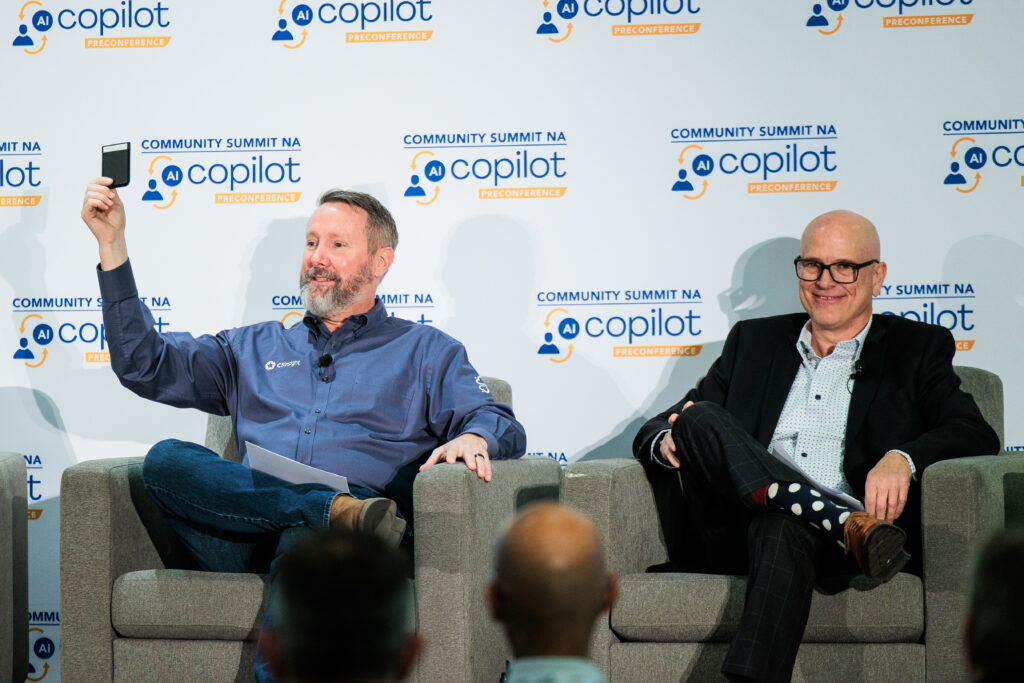Microsoft Execs, Partners, Customers Outline Copilot Wins and Agent Opportunities

The AI Copilot Preconference at Community Summit NA provided insight into the state of Copilots and Agents from the perspectives of top Microsoft strategy and product execs, partners in the community, and customers implementing Copilots.
Big themes throughout the daylong event included:
- The importance of actively addressing change management alongside the tech changes that AI and Copilots bring
- Why AI success requires a robust data strategy as one of its core underpinnings; this includes ensuring business stakeholders and their requirements are top drivers in AI projects
- Future opportunities and considerations when it comes to agents, which apply automations and varying levels of autonomy to Copilots
Microsoft Perspectives
Microsoft Copilot directions and product details were delivered by AI, Business Central, and Copilot executives.
AI leader Vik Singh, who is corporate vice president for Copilot apps, underlined the importance of having AI functionality “injected” or built directly into workflows and core business apps so that the applications “don’t require users to remember” to utilize or invoke the AI functionality that’s available to them. “Try not to add new learned behaviors,” Singh said.
Using the example of Microsoft’s own use of Microsoft 365 Copilot for Sales, Microsoft data indicates that sales reps are more productive when the AI functionality is in the flow of their work: the company’s analysis shows that Sales Copilot users enter 300% more data into CRM.
increasingly part of the industry’s Copilot discussions – whereby AI will evolve from assistants to automations running processes.

Mike Morton, vice president, Dynamics 365 BC & SMB at Microsoft, noted the significant role partners have to play in helping customers deploy, manage, and optimize Copilots within their business – and that was a recurring theme throughout the day. “We’re going to make it easier for the customers because we as a community are going to be the ones that are actually going to build it and make it approachable.”
Morton also noted that the pace of rollout of Copilots and agents over the next year will not be on a straight line with nonstop progress. “I think the pace is going to be uneven,” Morton says. “Some things are going to take longer” because they need to be woven into business processes, and thereby ensure the technology is safe from a security perspective.
In a demo of Copilot Studio, Dewain Robinson, principal program manager at Microsoft, weighed in on Copilot and Copilot Studio use cases that can deliver the most value for customers. While many companies focus on HR applications related to employee benefits and information retrieval, such business-to-employee (B2E) applications have “incredibly low ROI,” he said.
“B2E is the hardest place to get something functional and ready to go,” he noted, and low data quality is one factor making it difficult. Many more B2B and B2C use cases offer far greater revenue impact he said. He also noted Copilot Studio is “on fire” in financial services firms which have embraced Copilot functionality.

Partner and MVP Perspectives
A prevalent theme throughout the day was the importance of data to AI’s success: spanning data consistency, quality, cleanliness, governance, and more. Officials of Microsoft partner Columbus detailed the importance of aligning any AI initiative with the needs of the business stakeholders. In fact, those needs must take precedence over tech considerations, and they include evaluating potential projects based on factors including their potential value and ROI as well as the amount of quality data available in support of the project.
Michael Simms, Columbus vice president of digital advisory and analytics, asked those in attendance how many of their companies have data they’d rate as “high quality.” No one in attendance raised their hand, underscoring the challenge in achieving the high data quality that AI requires.
A Copilot MVP Panel on Copilot quick-win opportunities noted that one barrier to ongoing adoption is concerns – in many cases unfounded – that Copilot security is a liability. Those concerns are rising because of reports of security incidents around Copilots. “In every one of those cases, the user was a logged on user withing that domain,” noted Christopher Cognetta, chief technology and innovation officer at congruentx. “The beauty of all this stuff being within the Office 365 tenant is that CIOs have already approved access to the cloud, so this is enabling another technology that’s running inside of the cloud through the same security models,” he notes.
He added that security is a “poor excuse” to avoid use of Copilots. “Yes, you need to have conversations around it, but don’t use it as someone made a hack who’s a logged in user and say the system’s bad.”
Geoff Ables, managing partner of C5 Insights, noted an unexpected use case that’s paying off: a copilot coaching experience where a user can go into Copilot following a meeting or sending an email and ask for feedback on the quality of their work and how they can do better in these functions. “As we played with that one we started to realize there’s some incredible power,” Ables notes.
In a panel on selecting the optimal partner, several partner executives advised fellow partners to use AI to their advantage, particularly when marketing themselves to given prospects for the first time. That includes leveraging AI in their selling and scoping processes; for example, using AI to gather the client’s requirements for a Dynamics 365 or Business Central project. In so doing, they would both advance the proposal they’re working on and showcase the power of the technology for customer and helping them see it in live use cases.
Customer Copilot Perspectives
Vixxo, which provides field service technicians and services to large businesses including Starbucks, recently deployed Copilot technology to help its service technicians, some employees and many more are affiliated but not employees. The app aims to help them conduct repairs or service onsite by opening documentation, schematics, manuals and more with the latest product data in order to resolve issues quickly and efficiently.
Bobby Hunnicutt, vice president of IT at Vixxo, said the company found the underlying AI technology to be “startling” in its quality and robustness. The bigger challenge that Vixxo needs to tackle, he said, is change management for those who are being asked to use the technology to perform their jobs differently. The challenges that companies face in this respect include testing, data preparation, security, authentication, and more.
Hunnicutt recommends testing a variety of AI models and approaches to find the toolset that’s best for a given company’s application. He also advised having more business users involved as testers of models and data quality because of their knowledge of the process and data being the application being tested.
He suggested it will be increasingly important to develop product documentation and other technical documents with GenAI in mind (that generally means less formatting, less images, and more text) and possibly giving that precedence over optimizing content for Google.
Another user, Dukal, which manufactures medical supplies, said his company has experienced solid wins with transcription and summarization of meetings with Copilot. Michael Sedlock, vice president of information technology, reinforced the change management point. Getting employees to engage with the technology has been more difficult than expected, he said.



